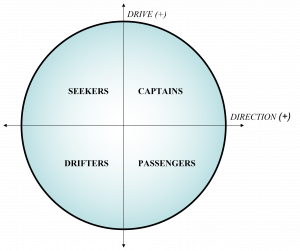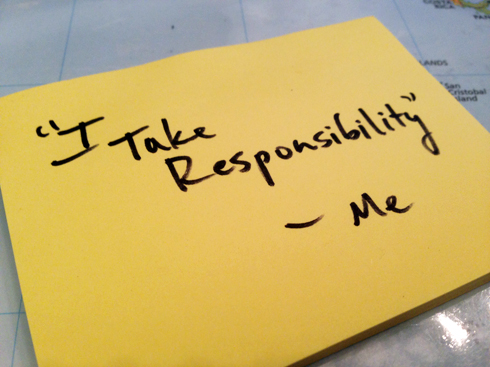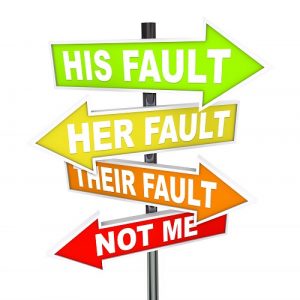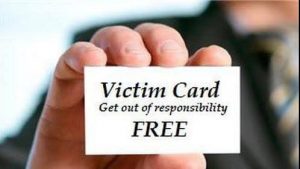Responsibility.
It’s a word we hear a lot. We take on more responsibilities as we go through life. Responsibility for the rent. Car payments. Mortgage. Deadlines. Getting the job done. These things can be daunting.
But there’s another aspect of responsibility that cuts the other way, that empowers us: taking responsibility for our lives.
And not just responsibility. Full responsibility.
What Does It Mean to Take Full Responsibility for Our Lives?
What does this mean? Carry out the logic and it leads to a sweeping conclusion:
Taking full responsibility for our lives means
taking full responsibility for everything in our lives.
Carry out the logic still further and it leads to a stunning insight, one that’s capable of transforming our lives:
Taking full responsibility for our lives means
taking full responsibility for everything in our lives,
regardless of what has happened or why.
That means taking full responsibility for our thoughts, feelings, words, actions, circumstances, and impacts. It means taking full responsibility for our health, relationships, education, career, finances, choices, behaviors, and free time.
Our ability to accept responsibility for things depends on our sense of agency: our perceived ability to influence events and direct them toward the achievement of our goals.

Quality of Life Assessment
Evaluate your quality of life in ten key areas by taking our assessment. Discover your strongest areas, and the areas that need work, then act accordingly.
Locus of Control
That brings us to what psychologists call “locus of control”: the extent to which we feel that we have control over the events of our lives. Are we the captains of our fate, steering the ship toward our horizon of choice, or are we drifters on a raft, being carrier by the current and winds randomly out to sea?

Researchers distinguish between an internal locus of control (when we believe that control over what happens resides within us) and an external locus of control (when we attribute success to luck, fate, or other outside influences). Note that locus of control occurs on a continuum; it’s not a one-or-the-other situation.
According to researchers, people with an internal locus of control tend to:
- be healthier
- report being happier
- exhibit more independence
- achieve greater success in the workplace
So far, we’ve seen that it means to take full responsibility for our lives. It sounds simple enough. But it’s quite difficult to do it consistently—and it’s exceedingly rare.
How to Know If You’re Not Taking Full Responsibility?
Most people bounce back and forth between taking responsibility for their lives and shirking that responsibility. How to know if we’re not taking responsibility?
When we’re avoiding responsibility, we’re tending toward the following:
- blaming others
- complaining about things
- feeling hopeless
- experiencing “learned helplessness” (when we stop trying to change things because we’ve become conditioned to believe that a bad situation is inescapable)
- feeling powerless
- drifting through life without traction on our deeper aims
- settling for a less than ideal situation

Take the Traps Test
We all fall into traps in life. Sometimes we’re not even aware of it, and we can’t get out of traps we don’t know we’re in. Evaluate yourself with our Traps Test.
The Incredible Benefits of Taking Full Responsibility
Taking full responsibility for all aspects of our lives, regardless of what has happened or why, is one of the most important things we can do to improve the quality of our lives, relationships, and work outcomes. It comes with many benefits. Taking full responsibility can:
- boost our confidence
- provide us with a more resilient sense of calm which isn’t dependent on others
- increase our decisiveness
- improve our health
- reduce our stress levels
- lead to taking more action in life
- help us achieve our goals
- free us up to see the good in people and situations
- help summon our courage
- lead to better relationships
- help us improve our follow-through
- invoke our power to choose
- dramatically improve our leadership
- help us craft our life intentionally
What We Must Give Up When We Take Full Responsibility
Clearly, the benefits are extensive. But they come at a price. Taking full responsibility means giving up on several bad habits and guilty pleasures. For example:
It means giving up on complaining.
“What you’re supposed to do when you don’t like a thing is change it.
If you can’t change it, change the way you think about it. Don’t complain.”
-Maya Angelou, poet and civil rights activist
It means giving up on making excuses.
“He that is good for making excuses is seldom good for anything else.”
-Benjamin Franklin
It means giving up on blaming others.
“An important decision I made was to resist playing the Blame Game. The day I realized that I am in charge of how I will approach problems in my life, that things will turn out better or worse because of me and nobody else, that was the day I knew I would be a happier and healthier person. And that was the day I knew I could truly build a life that matters.”
-Steve Goodier
It means giving up on being a victim.
“Abandon the idea that you will forever be the victim of the things that have happened to you. Choose to be a victor.”
-Seth Adam Smith
What to do instead? Instead of complaining, making excuses, blaming, or playing the victim, change your mindset toward one of agency and accountability. Instead of deflecting toward others (or toward bad luck), turn your gaze within and ask:
What is my role in this?
How have I contributed to this?
What will I do about it now?
Get curious about what happened and why, and what you might do differently in the future to make it better or avoid the same mistake.

Personal Values Exercise
Complete this exercise to identify your personal values. It will help you develop self-awareness, including clarity about what’s most important to you in life and work, and serve as a safe harbor for you to return to when things are tough.
What Taking Full Responsibility Doesn’t Mean
Taking full responsibility means holding ourselves totally accountable, but it doesn’t mean being a “Lone Ranger,” disconnected from others.
Even as we take full responsibility for our life, we can—and should—reach out to others for help. We can ask for their input, or for them to help hold us accountable.
For most people, strong social relationships are the most important contributor to enduring happiness. We’re wise to take full responsibility for our relationships too, instead of expecting others to know what we want or waiting for others to change.
Being accountable doesn’t mean being alone. It means being the captain of our lives, being a “life entrepreneur.”
And it ultimately means changing the trajectory of our lives toward more fulfillment and better outcomes.
“The luckiest people are those who learn early… that it’s essential to take charge of your own life. That doesn’t mean you don’t accept help, friendship, love, and leadership—if it’s good leadership—from others. But it does mean recognizing that ultimately you’re the one who’s responsible for you.”
-John W. Gardner, public official and political reformer
Reflection Questions on Taking Responsibility for Your Life
- In what areas are you:
-
- complaining?
- making excuses?
- blaming others?
- being a victim?
- What will you do, starting today, to take back the initiative and take full responsibility for the situation?
- Are you taking full responsibility for everything in your life, regardless of what has happened or why?
Tools for You
- Traps Test (Common Traps of Living) to help you identify what’s getting in the way of your happiness and quality of life
- Quality of Life Assessment so you can discover your strongest areas and the areas that need work, then act accordingly
- Personal Values Exercise to help you clarify what’s most important to you
Related Articles
- “How to Stop Blaming Others: 10 Tips“
- “The Trap of a Victim Mentality–And What to Do About It“
- “How to Break Bad Habits and Create Good Ones“
Postscript: Quotations on Taking Responsibility for Your Life
- “Self-leadership means taking responsibility for our own lives.” -Andrew Bryant & Ana Kazan, from Self Leadership
- “Character—the willingness to accept responsibility for one’s own life—is the source from which self-respect springs.” -Joan Didion
- “The degree to which you accept responsibility for everything in your life is precisely the degree of personal power you have to change or create anything in your life.” -Hal Elrod
- “Personal responsibility is the foundational key that opens the door to freedom…. the moment you choose to accept personal responsibility for all your inner experiences independent of what appears to have caused them, the escape hatch automatically swings open, providing you with the opportunity for passing into the land of freedom. You become authentically empowered, and you discover there really is a calm at the center for the fiercest hurricane where you can reside. In fact, eventually you realize that you are that calm.” -H. Ronald Hulnick and Mary R. Hulnick, from Loyalty to Your Soul
- “Hold yourself responsible for a higher standard than anyone else expects of you. Never excuse yourself.” -Henry Ward Beecher
- “Don’t believe the world owes you a living. The world owes you nothing. It was here first.” -Robert J. Burdette, 1883
- “A man can fail many times, but he isn’t a failure until he begins to blame somebody else.” -John Burroughs
- “Unless a person takes charge of them, both work and free time are likely to be disappointing.” Mihaly Csikszentmihalyi
- “Never tell your problems to anyone… 20 percent don’t care and the other 80 percent are glad you have them.” -Lou Holtz
- “Don’t complain; just work harder.” -Randy Pausch
- “See if you can catch yourself complaining, in either speech or thought, about a situation you find yourself in, what other people do or say, your surroundings, your life situation, even the weather. To complain is always nonacceptance of what is. It invariably carries an unconscious negative charge. When you complain, you make yourself into a victim. When you speak out, you are in your power. So change the situation by taking action or by speaking out if necessary or possible; leave the situation or accept it. All else is madness.” -Eckhart Tolle, from The Power of Now
- “I had to take complete ownership of what went wrong. That is what a leader does—even if it means getting fired. If anyone was to be blamed and fired for what happened, let it be me.” -Jocko Willink, from Extreme Ownership
- “You are responsible for the energy that you create for yourself, and you’re responsible for the energy that you bring to others.” -Oprah Winfrey

Gregg Vanourek’s Newsletter
Join our rapidly growing community. Sign up now and get monthly inspirations (new articles, opportunities, and resources). Welcome!
++++++++++++++++++++++++++++++
Gregg Vanourek is a writer, teacher, & TEDx speaker on personal development and leadership. He is co-author of three books, including LIFE Entrepreneurs: Ordinary People Creating Extraordinary Lives (a manifesto for living with purpose and passion) and Triple Crown Leadership: Building Excellent, Ethical, and Enduring Organizations (a winner of the International Book Awards). Check out his Best Articles or get his monthly newsletter. If you found value in this article, please forward it to a friend. Every little bit helps!







8 thoughts on “The Power of Taking Full Responsibility for Your Life”
This is really an insight for leadership. Thank you.
So glad you found value in it, Julius, and thanks for letting me know. -Gregg
This webpage marks the beginning of a very profound journey for me – Thanks much Gregg.
I am the only one responsible for my life.
So glad it was helpful to you, Kyle. Wishing you well with the embrace of that fundamental responsibility. It can be daunting but ultimately empowering. -Gregg
Excellent guidance and advice. Many thanks.
Many thanks, Tracy. So glad you found value in this, and here’s to taking full responsibility for our lives! -Gregg
This webpage has given great morale to the beginning of a very deep journey for me. Your article is excellent guidance and advice for new bloggers like me. – Thank you very much.
So glad to hear it, Krishna. That’s kind of you to let me know. Wishing you well on your journey and with your blogging. It can be a meaningful and fun adventure. Let me know if I can help! Cheers, Gregg